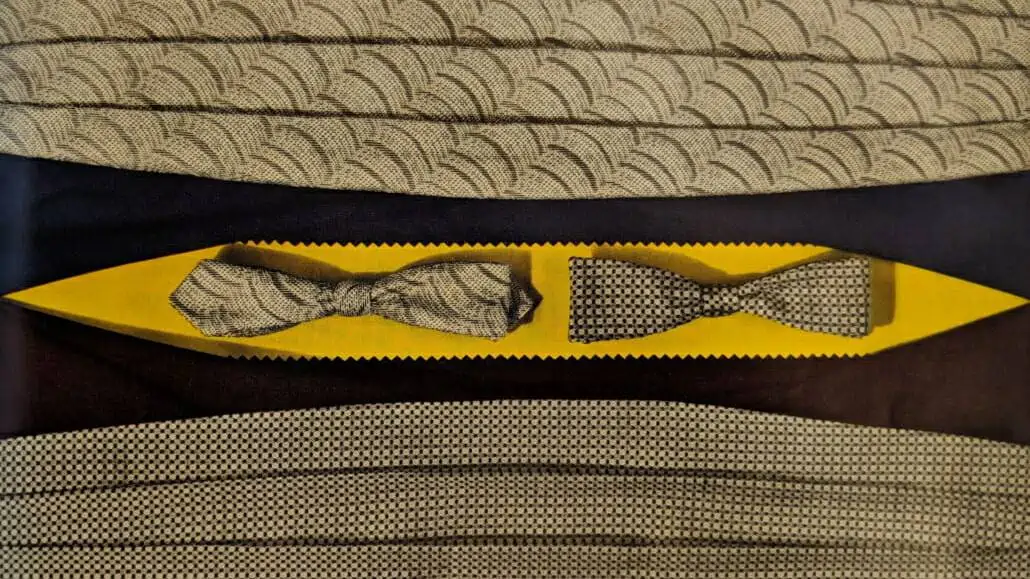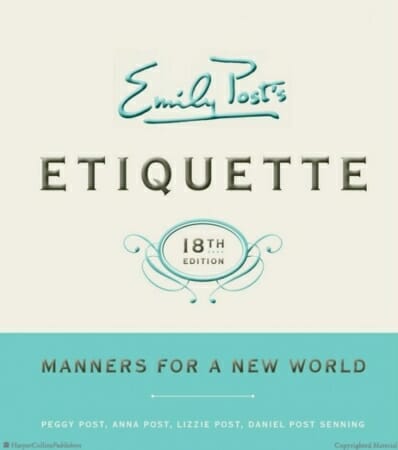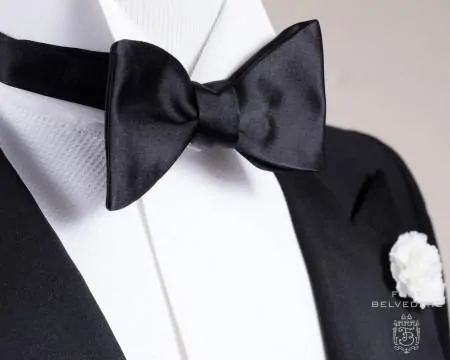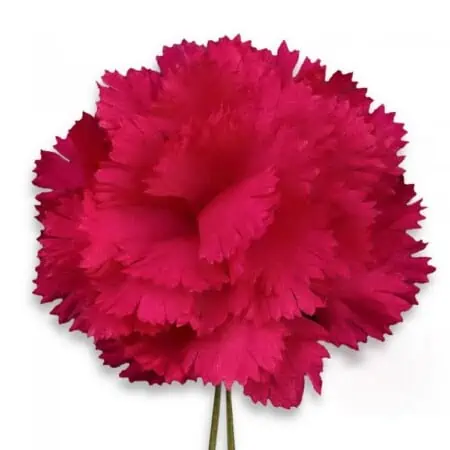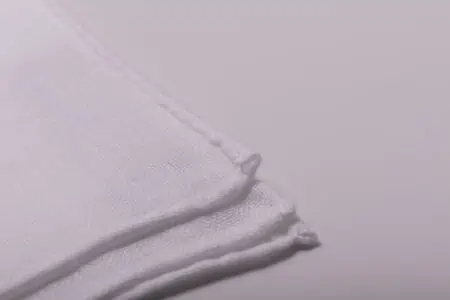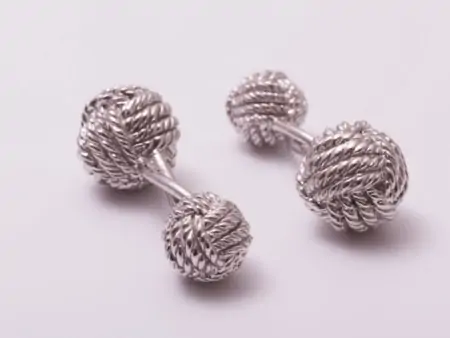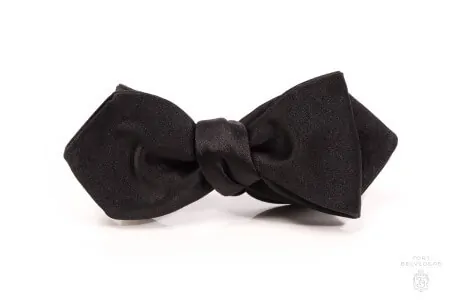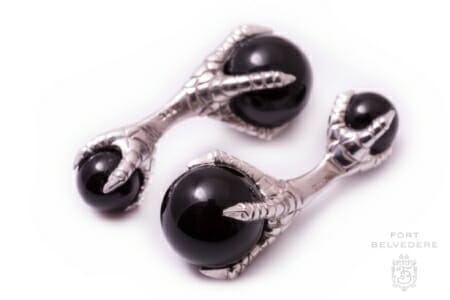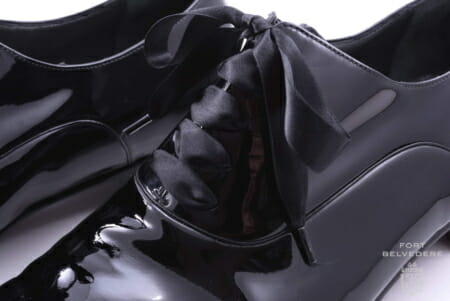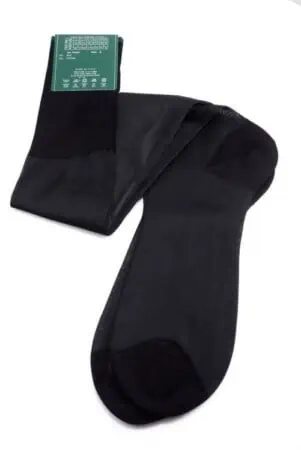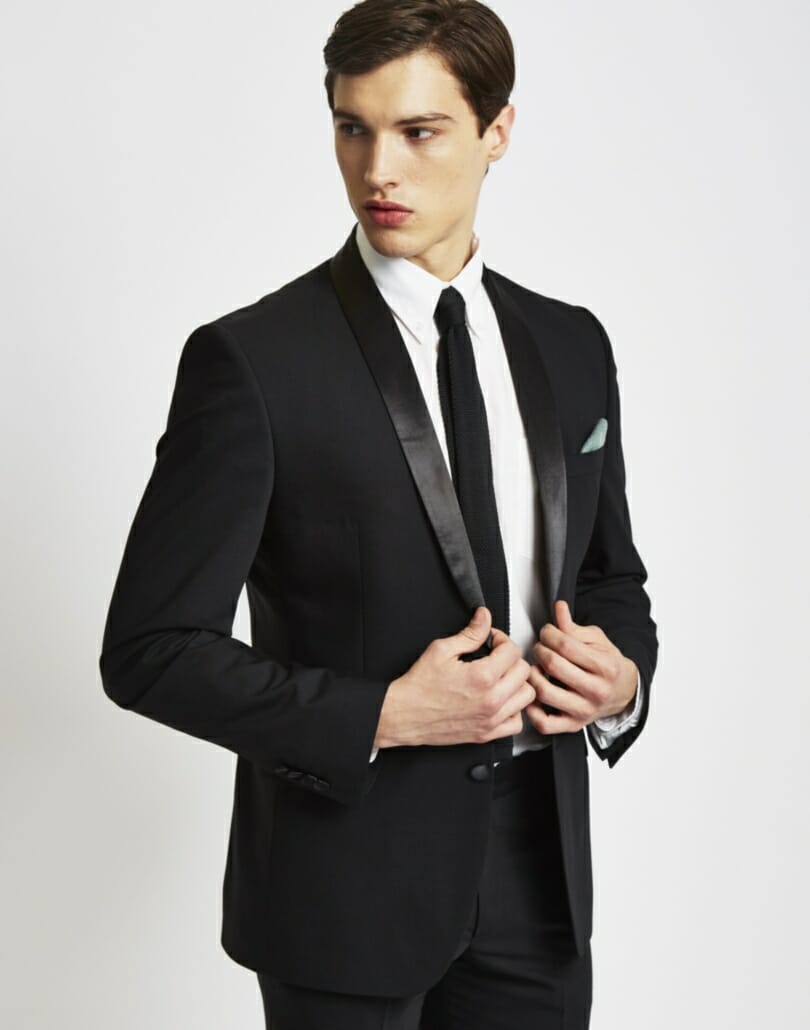
“A man without impeccable taste who attempts to individualize this uniform (for it is a uniform and its attractiveness lies precisely in its uniformity) risks looking like a snickering juvenile. There is nothing more pathetic than a failed flamboyant.”
Russell Smith, Style Columnist – Men's Style
This section of the Tuxedo & Black Tie Guide deals with the most precarious of all black-tie variations: contemporary alternatives. Men seeking to add personal flair without the use of tried-and-true classic alternatives or correct modern variations will require a great deal of prudence to avoid sartorial disaster.
- The Dark Suit Is Not A Tuxedo Substitute
- Tasteful Personalization
- Subdued Color
- Judicious Use of Metallic Tones
- Nuanced Patterns
- Velvet Fabric for Standout Dinner Jackets
- Mix & Match Formality
- Jacket Alternatives: Three-Button Dinner Jackets, Long Coats, Nehru Jackets, and Spencer Jackets
- Shirt Alternatives: Band Collars, Turtlenecks, and Different Colors
- Neckwear Alternatives
- Tuxedo Alternative: The Funeral Suit (Dark Suit & Tie)
- Formal Facts
The Dark Suit Is Not A Tuxedo Substitute
The safest route is to use the Tasteful Personalization guidelines below to help inject some unorthodox flair into your accessories without damaging the integrity of the overall outfit. The most precarious route is to opt for alternative garments offered by the mainstream formalwear industry. Most of the remainder of this page is dedicated to evaluating these transgressions and explaining why they should never be seen outside of high school dances or art gallery openings. Finally, we will examine a new alternative that replaces the tuxedo altogether: the black suit.
Because all of these alternatives will be reviewed in the context of black tie’s fundamental principles, readers should be sure to review those fundamentals in Lessons from the Past before proceeding any further.
“Events are formal so that a certain tone will prevail; introducing a jarring note that calls attention to itself is what the French call déclassé.”
Emily Post’s Etiquette
Tasteful Personalization
Unlike White Tie, Black Tie, especially Contemporary Black Tie, offers many opportunities for personal expression. Be mindful, however, of the impression you will make of yourself and upon others, and ensure that any deviations from traditional Black Tie conventions are subdued, nuanced, and never distracting.
Subdued Color
As explained in Classic Alternatives, although color is the simplest way to customize a black-tie ensemble its indiscreet use is the most common culprit in degrading the tuxedo to a sophomoric prom costume. To avoid this pitfall, stick to the simple guidelines offered by classic menswear authority Alan Flusser:
- Use only one colored accessory
- Use deep, rich colors
- Surround the color with black (i.e. limit it to waistcoats, cummerbunds or pocket squares)
Note that the bow tie is not included in the list of recommended colored accessories. Despite this, matching waist coverings and ties have been a staple of rented formal wear since the 1980s.
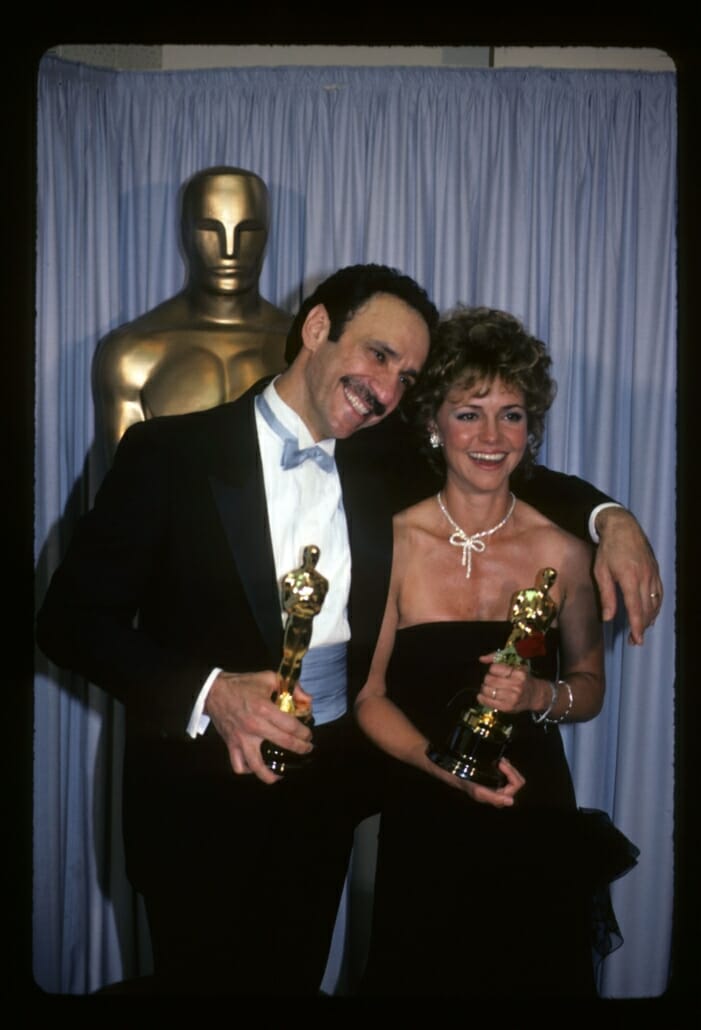
Besides detracting from the wearer’s face, matching sets promote the role of color from a simple accent to a de facto third component in what is supposed to be a two-tone scheme. Thus black tie’s uniformity is lost as is the impact of its stark black and white contrast.
Judicious Use of Metallic Tones
Adding a metallic finish to colored accessories has become a fashionable option since the 1990s. Silver is a particularly popular way of straddling the line between the current conservatism in formal wear and young men’s natural desire to stand out from the crowd. While too showy for traditional black-tie events, these shiny alternatives are appropriate for the informal weddings at which they are commonly seen. To minimize their Las Vegas lounge nature, stick to a deep silver and limit them to a cummerbund or a waistcoat that is just slightly taller than the dinner jacket’s opening.
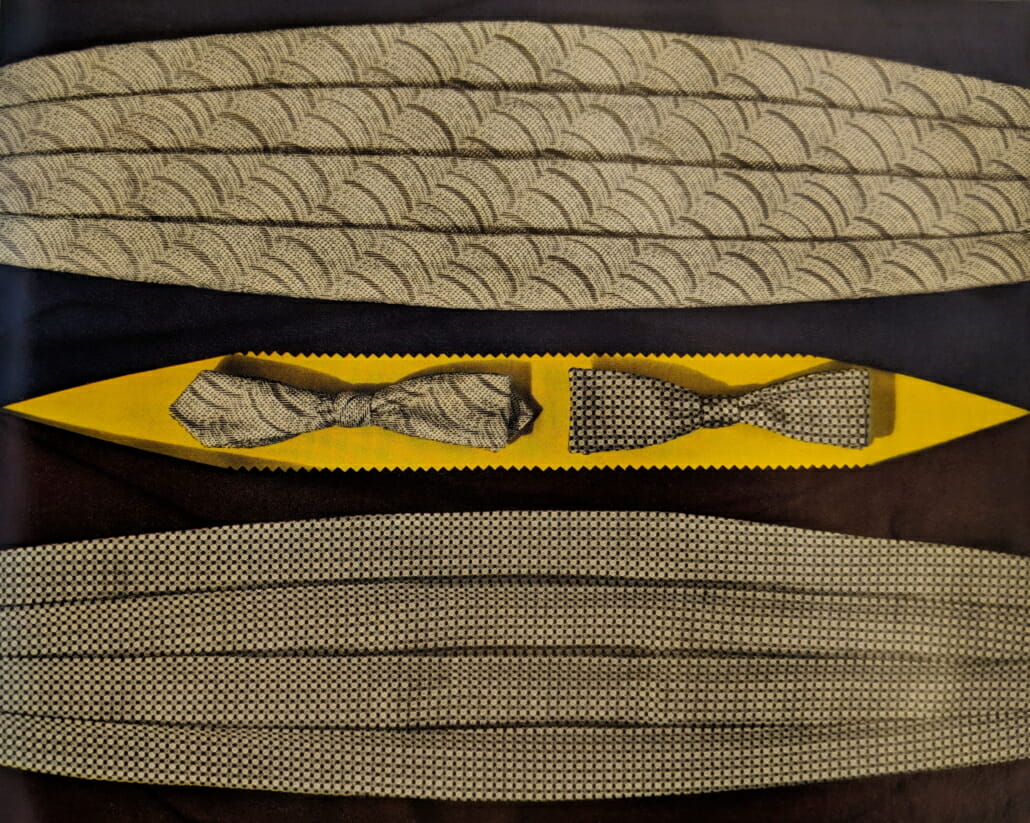
Equally popular at youthful weddings are four-in-hand ties of silver or white satin. Although they don’t dramatically underscore the face the way a black bow tie does, they also don’t detract from it like a black long tie does. In addition, they serve to complement the bride’s white dress without breaking the tuxedo’s black-and-white code. Just make sure they are not worn with matching vests nor are they pre-tied; if you’re old enough to commit to a lifelong marriage then you should be old enough to knot your own necktie.
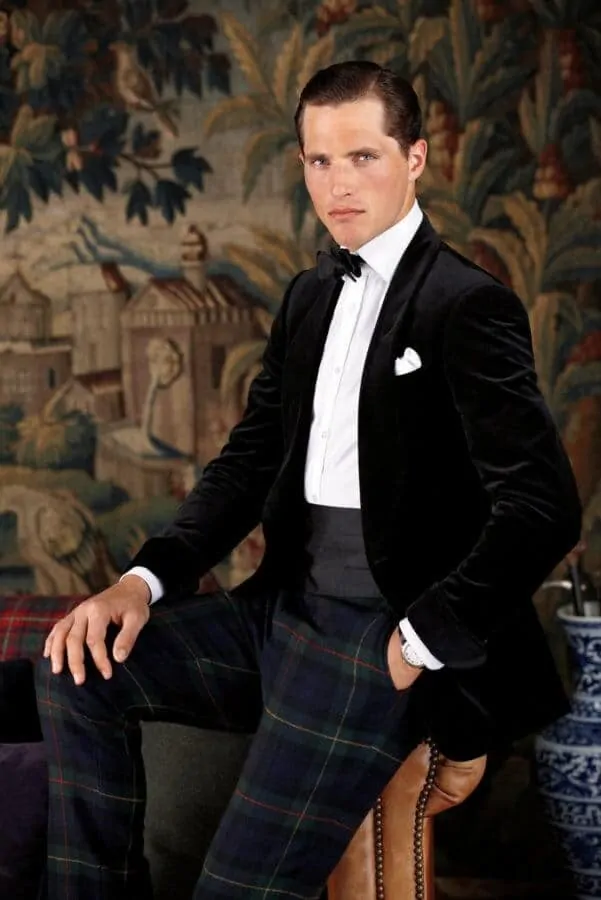
Nuanced Patterns
Pattern exploded onto black-tie attire in the late 1950s alongside vibrant colors and metallic sheens and it remained popular throughout the subsequent Peacock Revolution. Then the return of conservatism in the 1980s reined in the excesses of the counterculture movement and pattern became limited primarily to accessories. These accents remain perfectly legitimate alternatives today provided they observe a few simple caveats to keep them true to black tie’s refined minimalism:
- They are tone-on-tone or
- They are limited to a two-color design with one of the colors being either black or white and the other being a dark hue
- They do not use white as a predominant color, with the exception of pocket squares
- They do not appear in more than one accessory
Notably, pattern is one of the few appropriate means for personalizing one’s bow tie provided that it is restricted to a subtle white design against a black background. The use of prominent designs or any type of color will detract from the wearer’s face which is the intended focal point of any refined outfit.
Striped tone-on-tone tuxedos have been around since the early ’80s but conflict with the suit’s intended role as a neutral foundation for the rest of the outfit.
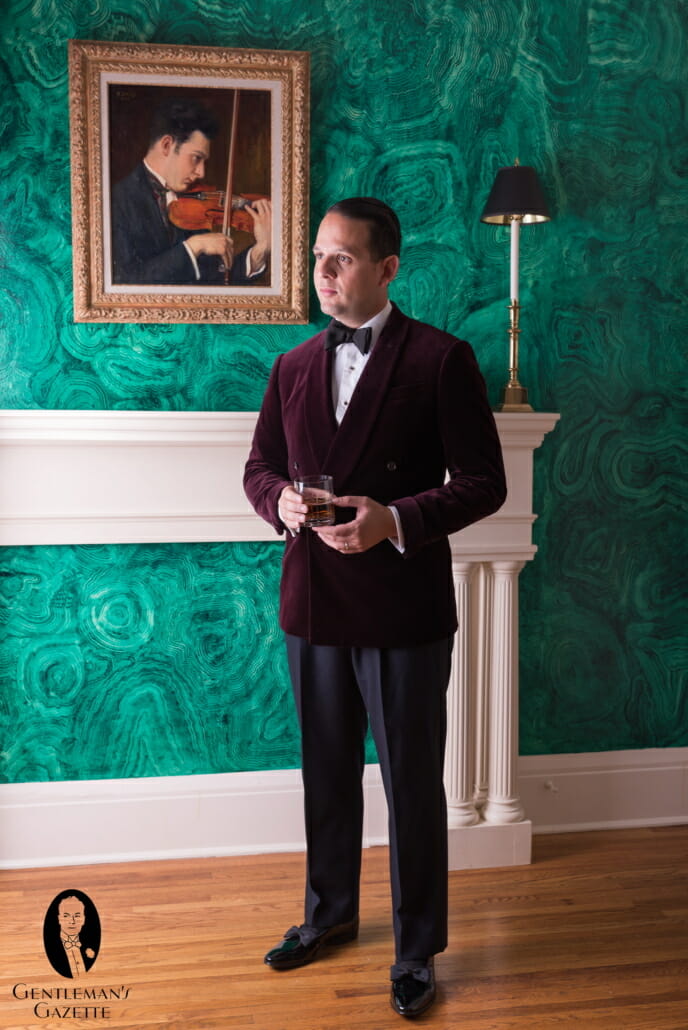
Velvet Fabric for Standout Dinner Jackets
Combining the rich fabric of the smoking jacket and the familiar styling of its tuxedo offspring, the velvet dinner jacket is both alternative and traditional at the same time. This makes it the only acceptable modern variation of the dinner jacket. Available in various dark colors since the 1960s it has always been most popular – and arguably most striking – in formal ebony.
Revived from the 1970s (albeit in much more tasteful proportions), the regular black velvet bow tie or black single end velvet bow tie have been a very recent vogue on the red carpet. Like the black velvet jacket it is very effective at adding panache in a manner that is respectful of black tie’s fundamental principles. For best effect it should be made of quality cotton or silk material and the band must hidden by a turndown collar, or sized without any adjuster like the ones from Fort Belvedere
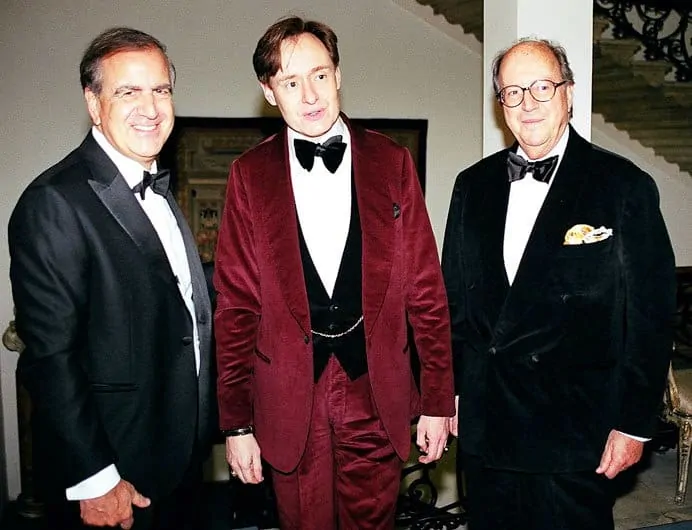
Entire tuxedos made of velvet have also been showing up on the red carpet as of late. To avoid being too much of a good thing it’s essential to keep the accessories traditional; adding color or pattern will push the outfit into the realm of the theatrical.
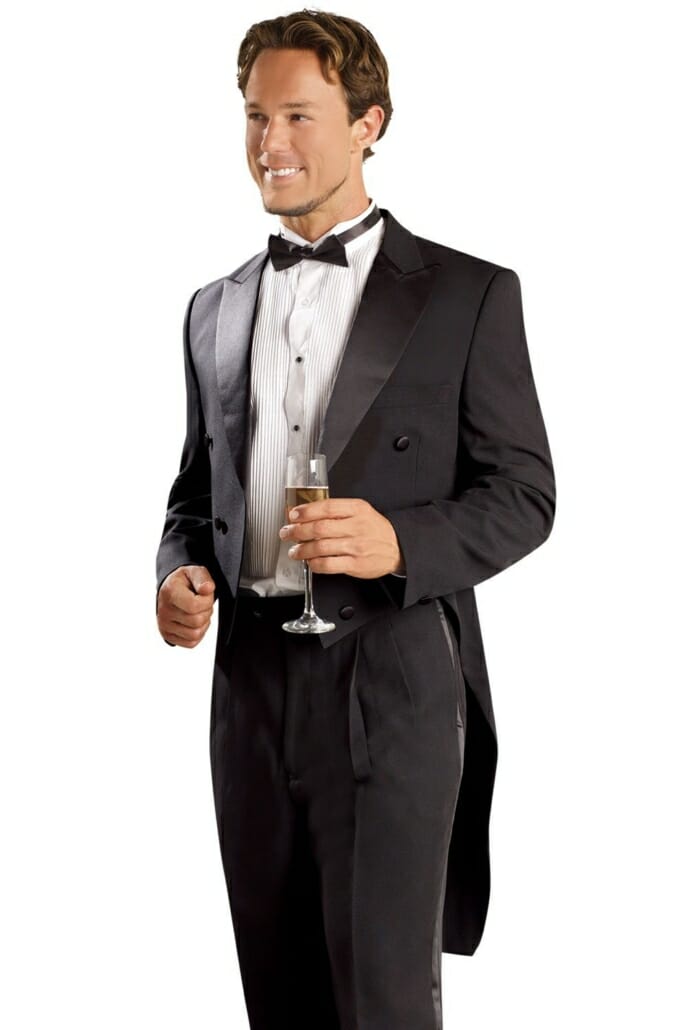
Mix & Match Formality
Mainstream formalwear retailers have discovered an ingenious method for offering gullible young customers unique alternatives: mix and match their existing inventory. Sartorial classicist Nicholas Antongiavanni explains the implications of such customization:
One way the English upper class maintained the distinction between servant and served was by forcing the former to wear correct attire in incorrect combinations. Thus butlers wore black tie with tails, clerks long ties with wing collars, and footmen bow ties with morning coats and even striped trousers with tailcoats. Though butlers and footmen are rare today, they still dress like this; and no one who is not one wants to look like one.
Other experts provide similar warnings about integrating formal and informal attire. Russell Smith asserts that the current vogue for combining a tuxedo with a long tie “will make you look like a drug-addled actor who got lost on his way to the Academy Awards” while the authors of A Gentleman Gets Dressed Up warn that when a man mixes a dinner jacket with blue jeans for a hip personal style “he runs the risk of suggesting that only half his suit was returned from the dry cleaners.”
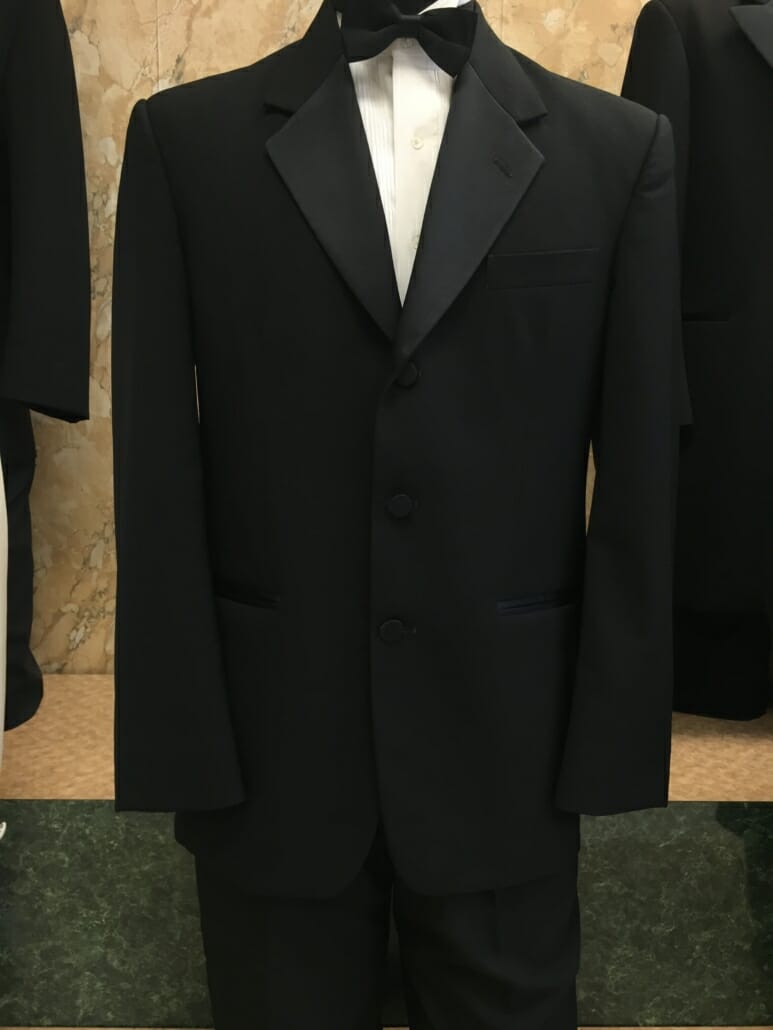
Jacket Alternatives: Three-Button Dinner Jackets, Long Coats, Nehru Jackets, and Spencer Jackets
Three-Button Dinner Jacket
Three-button jackets are for business attire, not formal attire. Their shorter lapels are not substantial enough for sweeping shawls or stately peaks making them appropriate only for the relatively modern notch style. They also cover up more of the shirt than one- or two-button models, thus robbing the outfit of much of its dramatic black-and-white contrast. In addition, the extra buttons and buttonholes create visual clutter that is at odds with the jacket’s intended refinement.
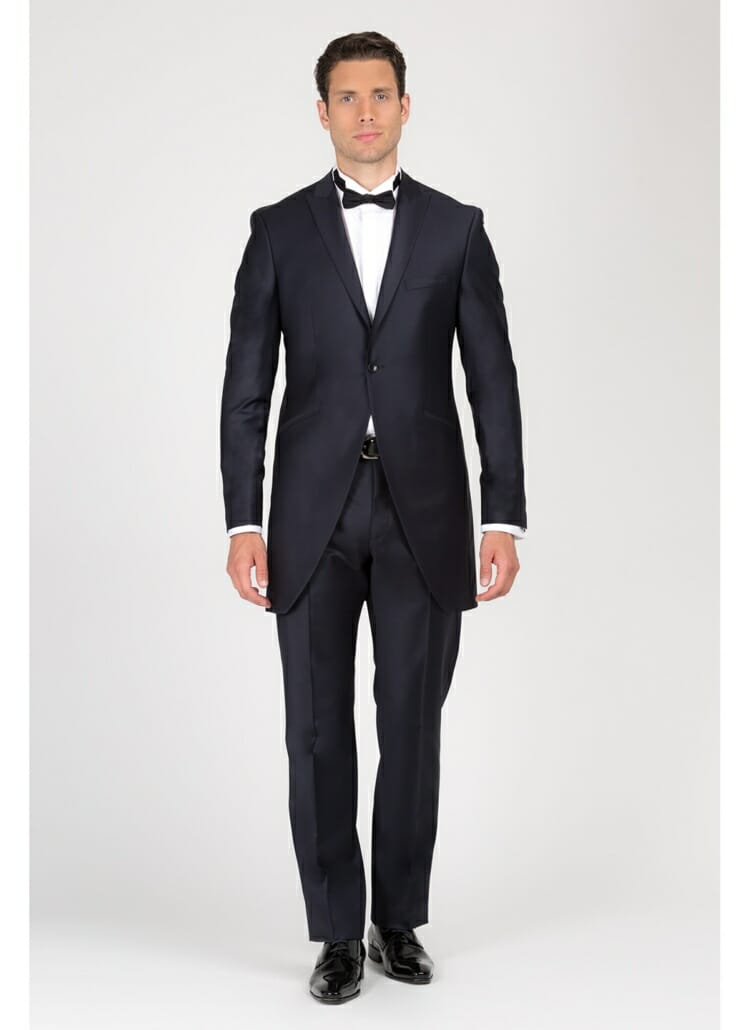
Long Coat
The modern three-quarter-length formal coat – known as a Prince Edward coat in the UK – is a variation of the Edwardian formal day garment known as a frock coat. Despite its incompatible pedigree, many celebrities adopted it as evening wear during the “Creative Black Tie” trend of the 1980s and ’90s and the fad soon caught on with teenage imitators. Almost invariably constructed with notched lapels and paired with a long tie it is entirely inappropriate for traditional black-tie functions.
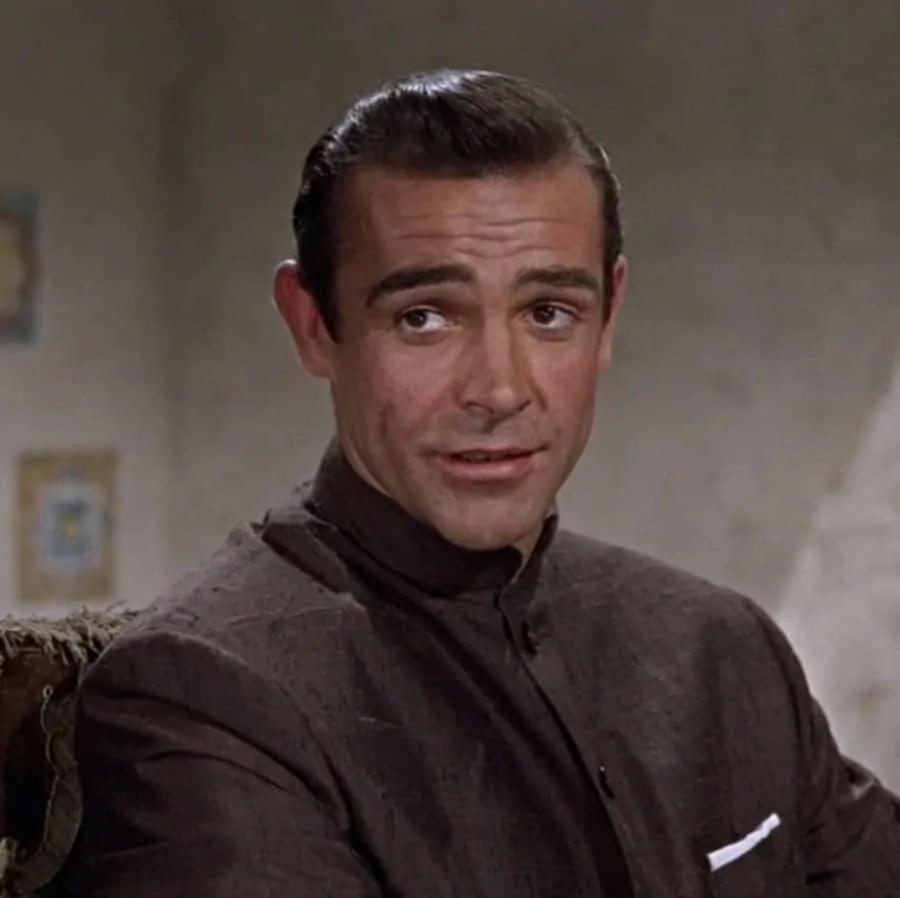
Nehru / Mandarin Collar Jacket
Another product of the creative formalwear fad of the 1990s was the revival of the 1960s Nehru jacket, now re-christened as the “mandarin collar coat”. Like the three-quarter-length coat, this alternative model’s popularity has declined significantly in recent years but is still available from some formalwear retailers. Although it incorporates the minimalism and predominance of black associated with black tie it lacks the dinner jacket’s elegance and tradition. Without faced lapels and the exposed V of white shirt there is no emphasis on a narrow waist and wide shoulders. Add to that the lack of bow tie and there is also no uniformity amongst formally dressed males. Barring a legitimate claim to the Nehru as article of one’s national dress, it would be best to leave this style of jacket to less formal affairs.
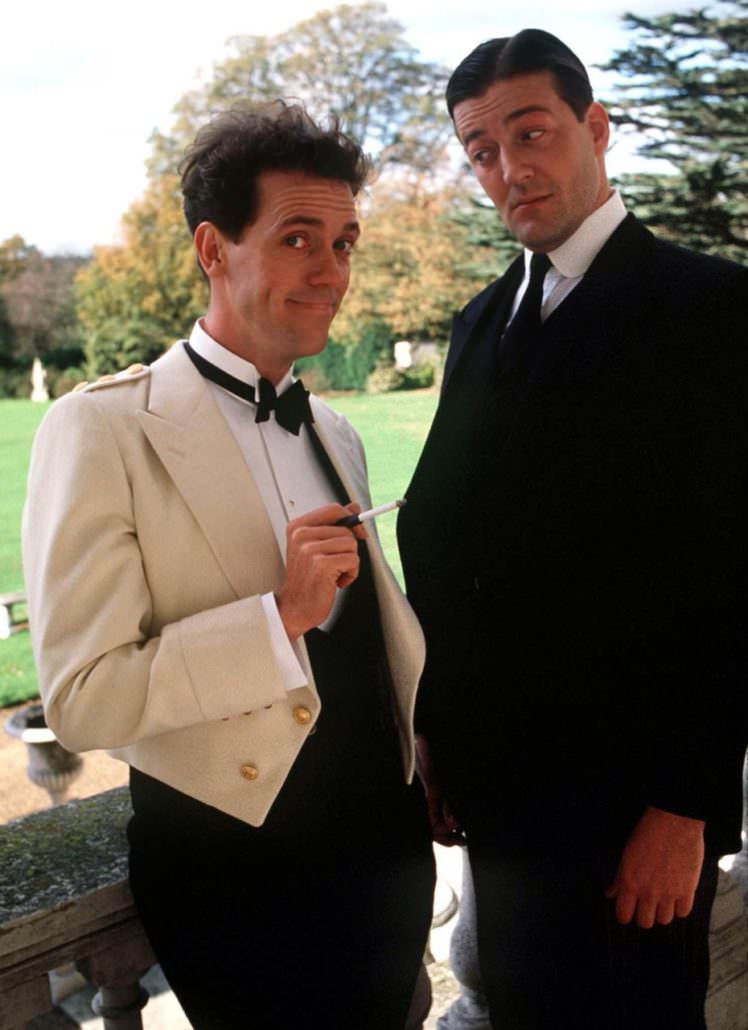
Spencer / Eton Jacket
In the 1790s the second Earl Spencer removed the tails from his tailcoat and the eponymous fashion was taken up by the English elite. In the following century the style was adopted by England’s prestigious Eton College which mandated a single-breasted version of the waist-length jacket for its junior students. The style was so admired that the so-called Eton jacket became standard dress clothes for young boys on both sides of the Atlantic.
The Spencer was also the jacket of choice for the British military in 1845 when it introduced evening dress for use at formal mess hall functions. Re-christened as a mess jacket, it was later instituted by armed forces in other Commonwealth countries and eventually in the United States. In the early 1930s the white version of the mess jacket was adapted for civilian semi-formal wear (see our video What Men Really Wore in the 1930s) although the fad was short-lived thanks to its rapid adoption by waiters and jazz bands.
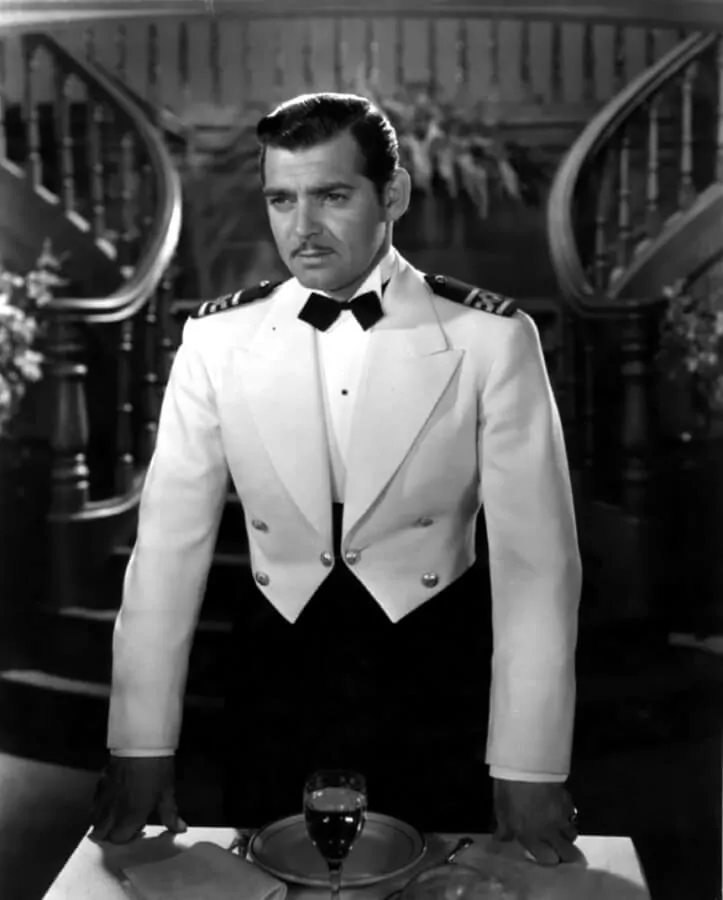
In the 1980s the Spencer jacket reappeared in layman formal wear and this time it was made of black material with satin facings, had a slightly longer cut and was usually worn buttoned. While the trousers could be matching or separate, the choice of cummerbund and bow tie accoutrements and shawl or peaked lapels maintained the tradition of the previous civilian mess jacket. The contemporary Spencer jacket remains a formal alternative today although it suffers from the same stigma as its martial predecessor: known in the hospitality industry as an Eton jacket, it is the standard uniform of bellboys and cruise directors and thus holds little appeal for discriminating dressers. (A notable exception is the Scottish variant called the Prince Charlie jacket which is a dashing and integral component of Highland black tie.)
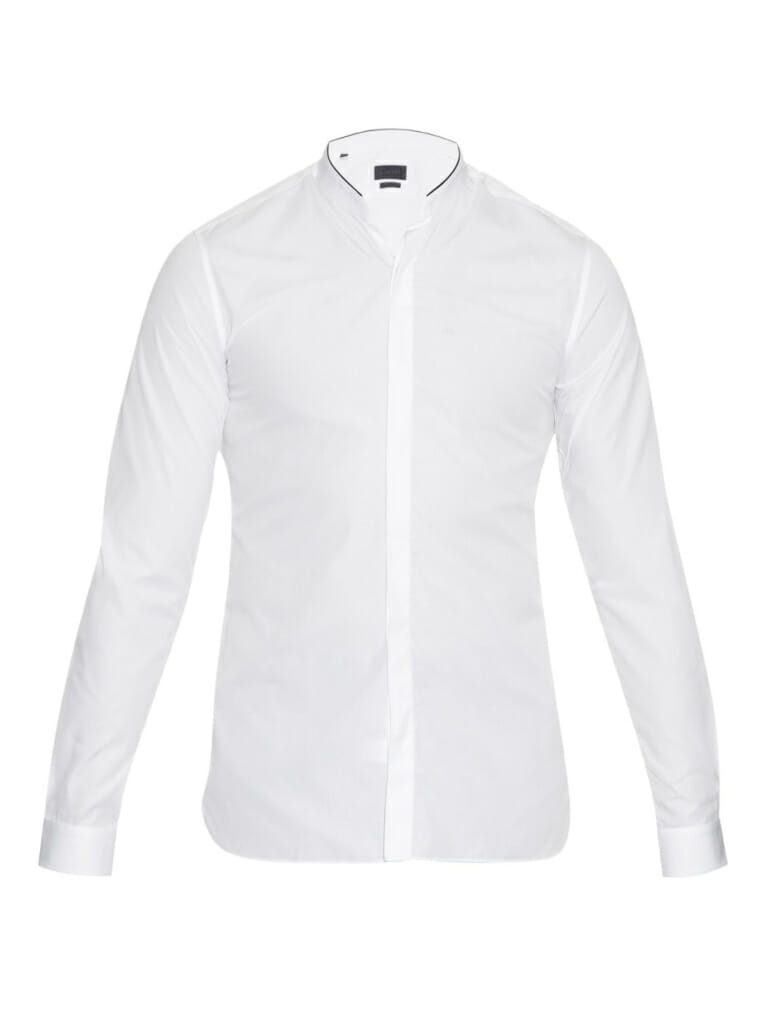
Shirt Alternatives: Band Collars, Turtlenecks, and Different Colors
Band Collar Shirt
The band or mandarin collar shirt was originally introduced in the 1960s in conjunction with the similarly styled Nehru jacket. Its popularity peaked during the Creative Black Tie fad of the 1990s when it was often paired with regular dinner jackets. Even though the shirt usually takes studs and pleats, its short and virtually bare collar cannot frame a man’s face as stylishly and formally as a traditional collar finished off with a black bow.
Black Shirt
The black shirt is yet another of the formal variations offered up by Hollywood in the 1990s, albeit one with more staying power. This fashion may seem to adhere to black tie’s classic black-and-white palette but in fact it replaces the two-tone arrangement with a monochromatic scheme. Just like the Nehru jacket, it strips the traditional outfit of the V-shaped patch of white shirt that serves both as a striking contrast and as a visual illusion of a narrower waist and broader shoulders. The end result is an ebony monolith that transforms a man into “a head bobbing on a full hand of black cloth” in the words of The Aesthetics of the Tuxedo. Attempting to compensate for this sartorial black hole by adding a white four-in-hand tie only gives the impression that the wearer is attending a mafia wedding.

Black Cashmere Turtleneck
A much more refined take on the black-on-black look is the ebony cashmere turtleneck, perfect for a Creative Black Tie outing. Using this garment to replace the traditional shirt, necktie and waist covering all at once has a couple of advantages over the black-shirt-and-tie option. First, it comes across not as tepid tinkering but as a calculated break from convention. Second, it substitutes all the pleats, bows and buttons of the black-shirt variation with an uninterrupted expanse of a luxurious wool-cashmere blend.
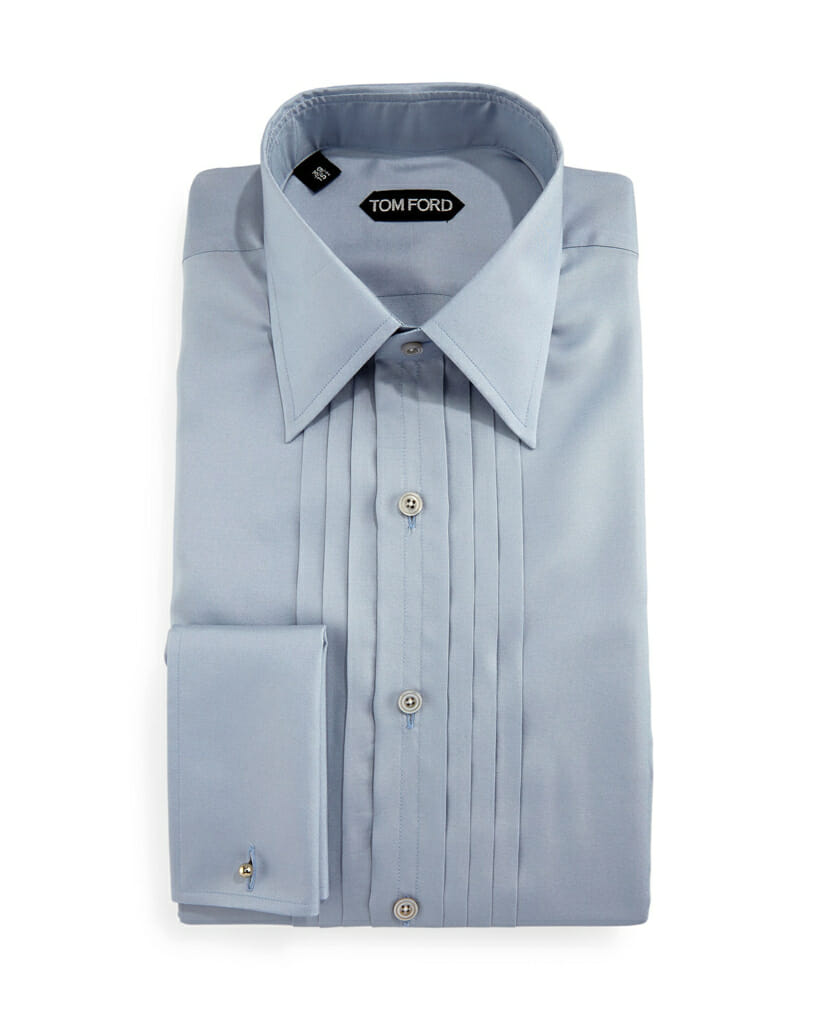
Colored Shirts
Pastel-colored formal shirts appear from time to time but they are unsuitable for even the most informal of black-tie occasions. Unlike accessories, shirts display color in multiple locations (bosom, collar and cuffs) which completely throws off the black-and-white palette.
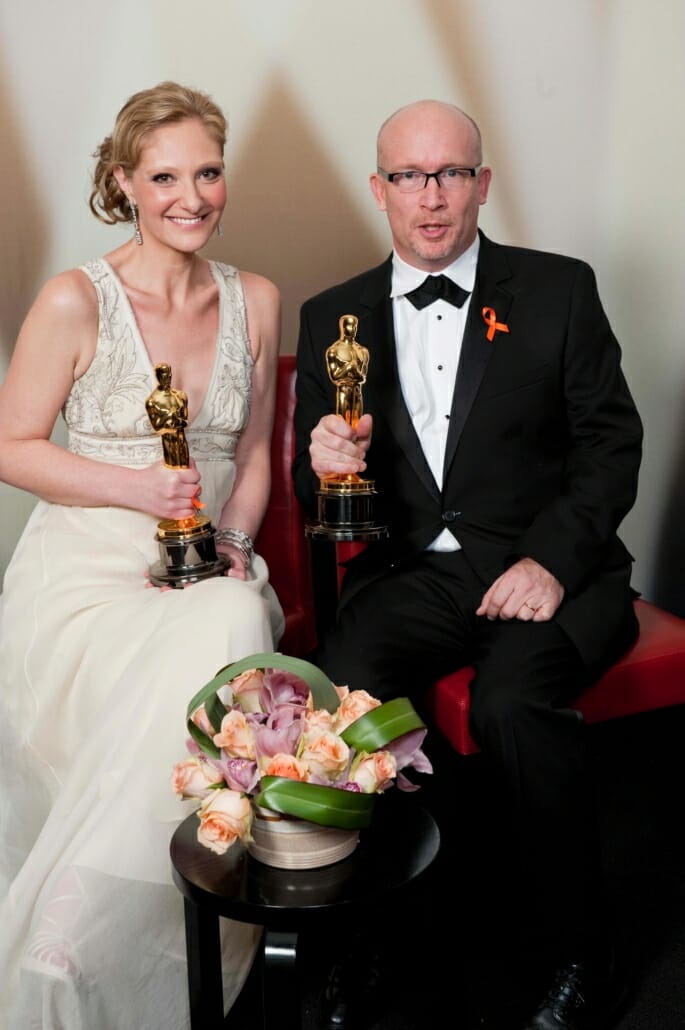
Neckwear Alternatives
Continental and Western Ties
Introduced in the 1960s, continental ties are only rarely seen now. The crossover version of this tie is simply a strip of satin fabric that overlaps under the throat where it is held together by a pin or snap. While it lacks the personal touch of a self-tied bow, its understated and unique design makes it passable at less formal occasions.
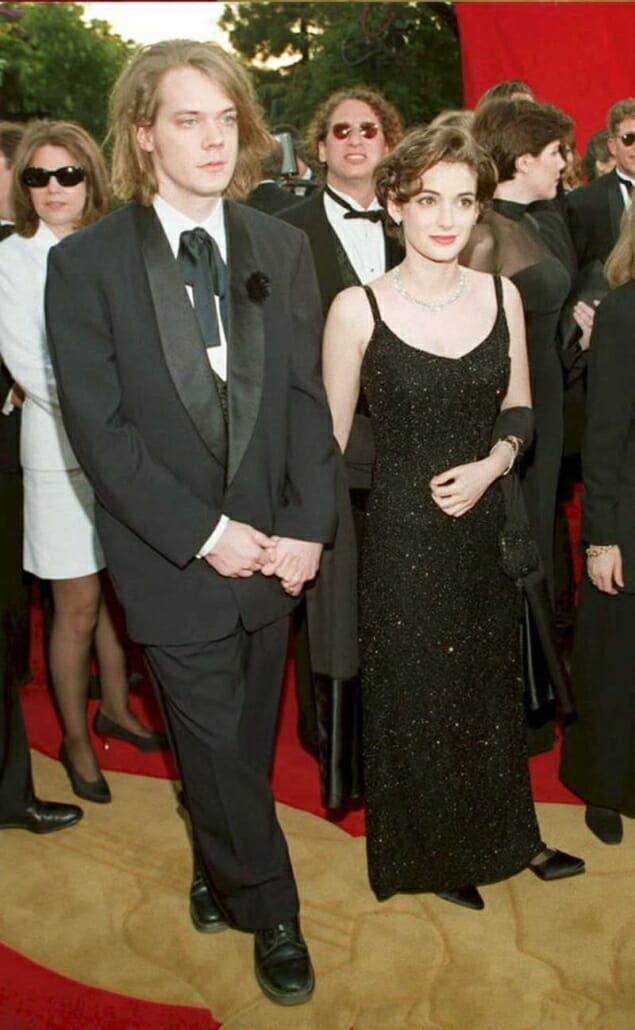
Even less common is the V-shaped version of the tie which is basically a pointed satin choker that fastens behind the neck. When decorated with a small white pin in the center of the exposed front it can be as elegant as the crossover style. When embellished with a more elaborate pin or broach it approaches the worst excesses of the 1980s New Wave look.
Continental ties are primarily found at western-themed formal shops today, along with formal string ties and bolo ties which should be reserved for black-tie rodeos. And even then, stick to black colors and turndown collar shirts unless you’re serving fried chicken at the concession stand.
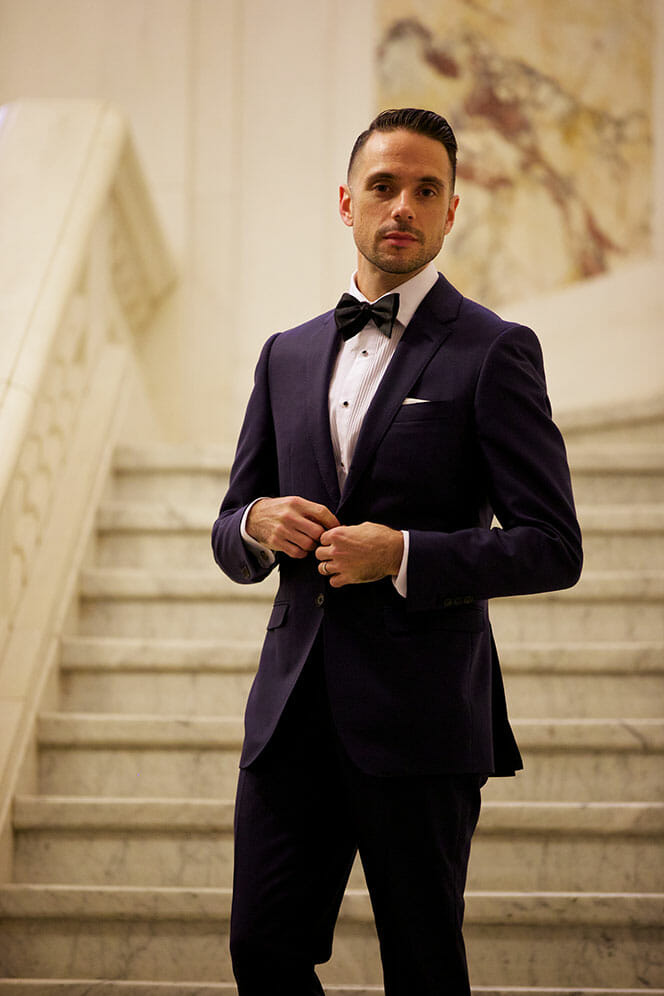
Tuxedo Alternative: The Funeral Suit (Dark Suit & Tie)
“There always have been – and probably always will be – men attempting to pass off a black suit as ‘formal wear’, said GQ in 1972. “Such gaucherie is obviously its own reward.” Apparently, the reward was substantial because this has become a familiar sight at black-tie events in the new millennium. A Gentleman Gets Dressed Up explains why:
It is preferred by younger men likely for economy, style and familiarity. Economy because instead of renting tuxedos each time or buying one that is rarely ever worn, a black suit can be used not only at formal evening functions but also at informal day and evening functions. Style because it mirrors suit styles and is therefore seen as hipper and more modern than the century-old tuxedo. Familiarity because they are unfamiliar with details like shawl collars, satin facings, waist coverings, wing collars, bow ties and can feel intimidated by them.
While there is no dress code or tradition that governs how the suit should be worn, GQ offers some sound advice:
It’s got to be the right black suit. It should be perfectly tailored, and it should be solid black—not pin-striped, not charcoal gray, not navy blue. Also, remember to have your suit pressed or dry-cleaned before the big day. It should look as crisp as possible. You want people complimenting you on your suit instead of asking why you’re not wearing a tux. Don’t try to fool people by wearing a bow tie with your black suit. Go with a straight black tie instead—satin or silk, no patterns or prints. Raise the profile of your suit with a beautiful French-cuff shirt. It’s worth the splurge
To learn more about proper funeral attire and etiquette, check out this guide here.
Admittedly, in the hands of the ignorant, the tuxedo is often its own worst enemy. Compared to an ill-fitting rental with a tacky pre-tied bow tie and flaccid wing-collar shirt, a black suit and tie is inarguably a superior choice. However, compared to a properly tailored dinner jacket with a self-tied bow tie and elegant turndown-collar formal shirt, the black suit is utterly pedestrian. For reasons explained in preceding pages, the common suit lacks traditional black tie’s aesthetic advantages (maximizing a man’s physical stature and drawing attention to his face), sartorial benefits (imparting sophistication and swank) and its tradition.
Obviously, a man has every right to deprive himself the tuxedo’s aesthetic and sartorial benefits but choosing to do so at an event that specifically calls for black tie has more far-reaching implications. His self-centered decision to break with tradition not only insults his hosts by ignoring their wishes but also disrespects his fellow guests by depriving them of the code’s special uniformity. When hosts state Black Tie on an invitation they expect the men to show up in tuxedos, not funeral attire.
Formal Facts
Classic Alternatives
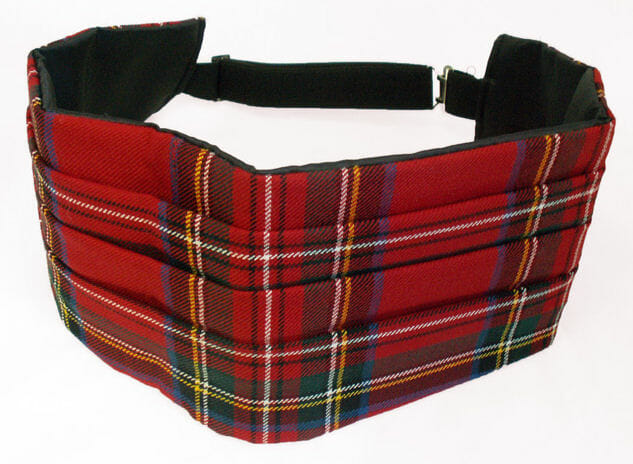
For tasteful personalization options that have stood the test of time, check out Classic Alternatives
(Not So) Well-Suited: Avoid Matching Sets
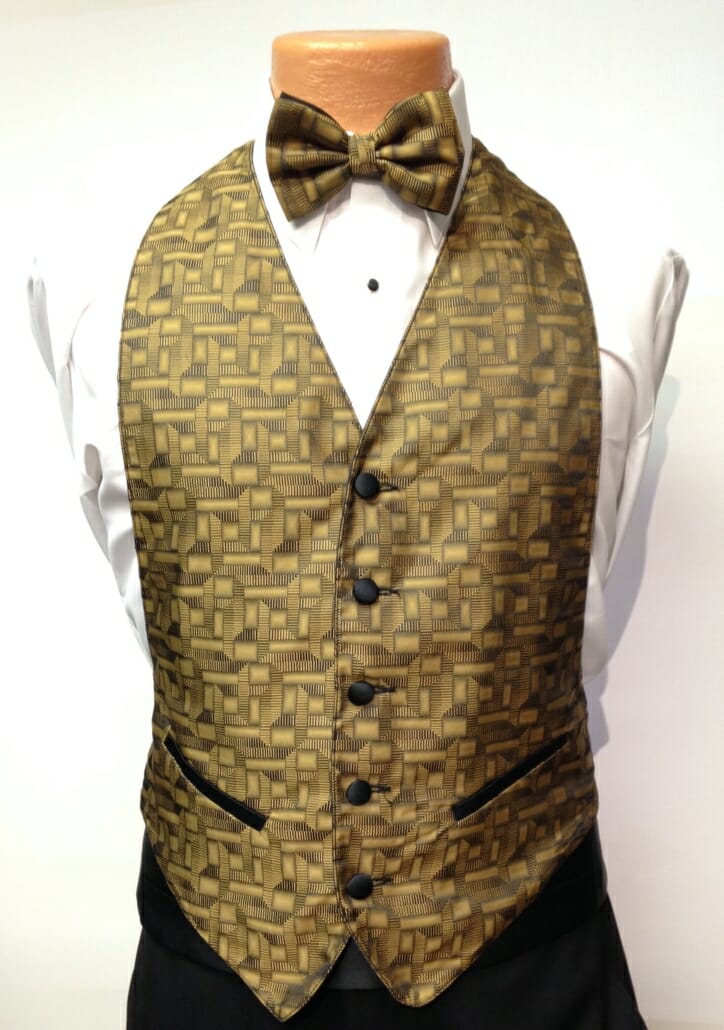
Matching ties and waist coverings have become such a staple of formalwear rental shops that you won’t even find a “bow tie” category on some of their web sites. Instead, they are treated as part and parcel of the “vests” and “cummerbunds” categories.
But not only are non-black matching settings a-historical, they tend to produce an overwhelming visual effect that is rarely pleasing and therefore ought to be avoided.
Well-Suited: Smart Shopping
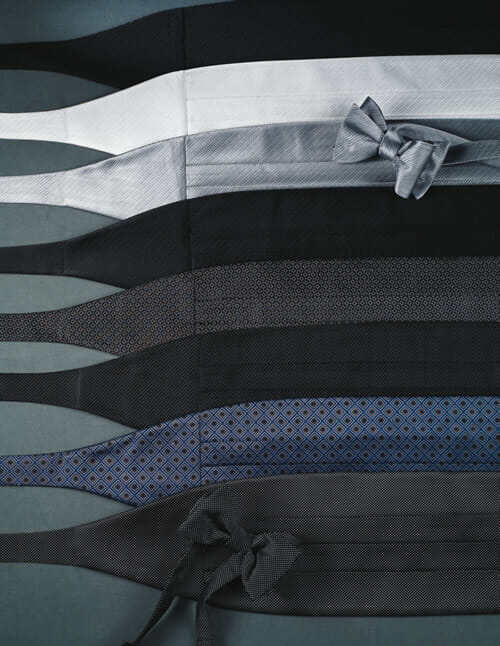
Even if you decide to rent your tuxedo, consider buying your own black tie accessories. They are considerably cheaper than a jacket and trousers and can help elevate even the most pedestrian rented suit.
Peruse high-quality black tie accessories from Fort Belvedere at our Shop
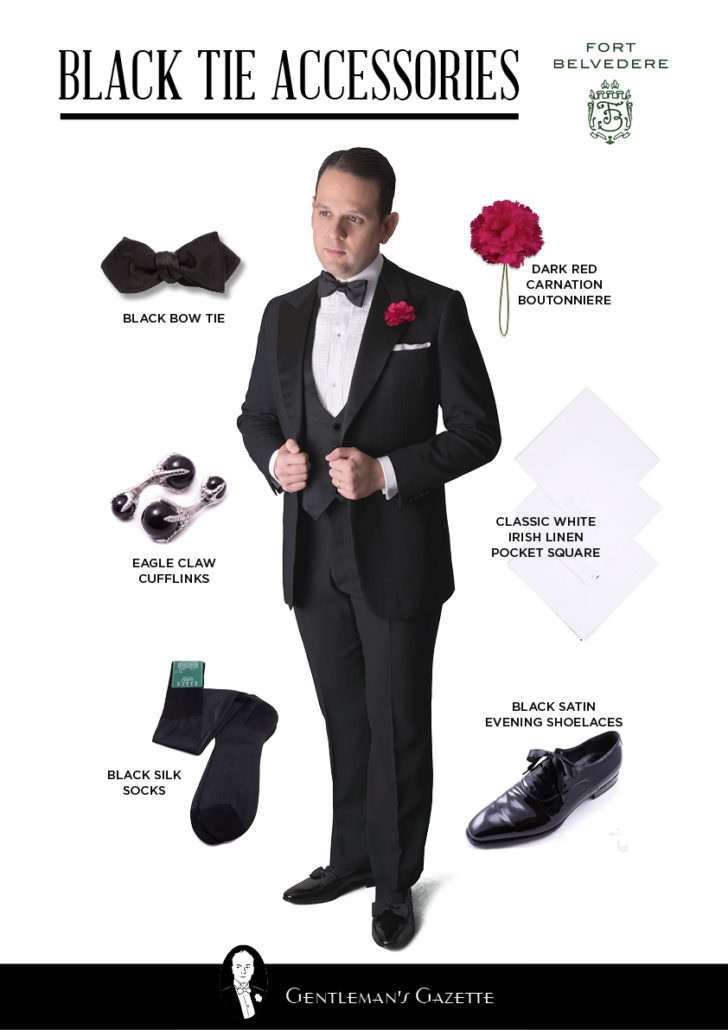
Contemporary Warm-Weather Black Tie
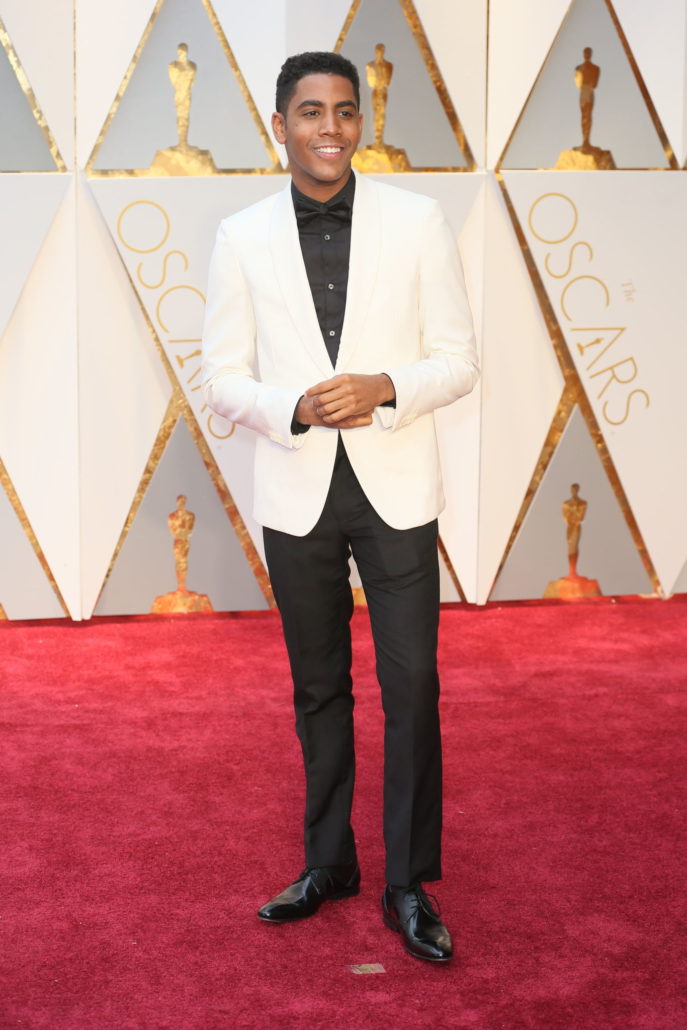
Surprisingly, there have been no recent alternatives for the hot-weather version of black tie. This is most likely because rental companies have turned their attention to light-colored suits for tropical “destination weddings,” the most common type of warm-weather formal occasion today.
The Prince Charlie
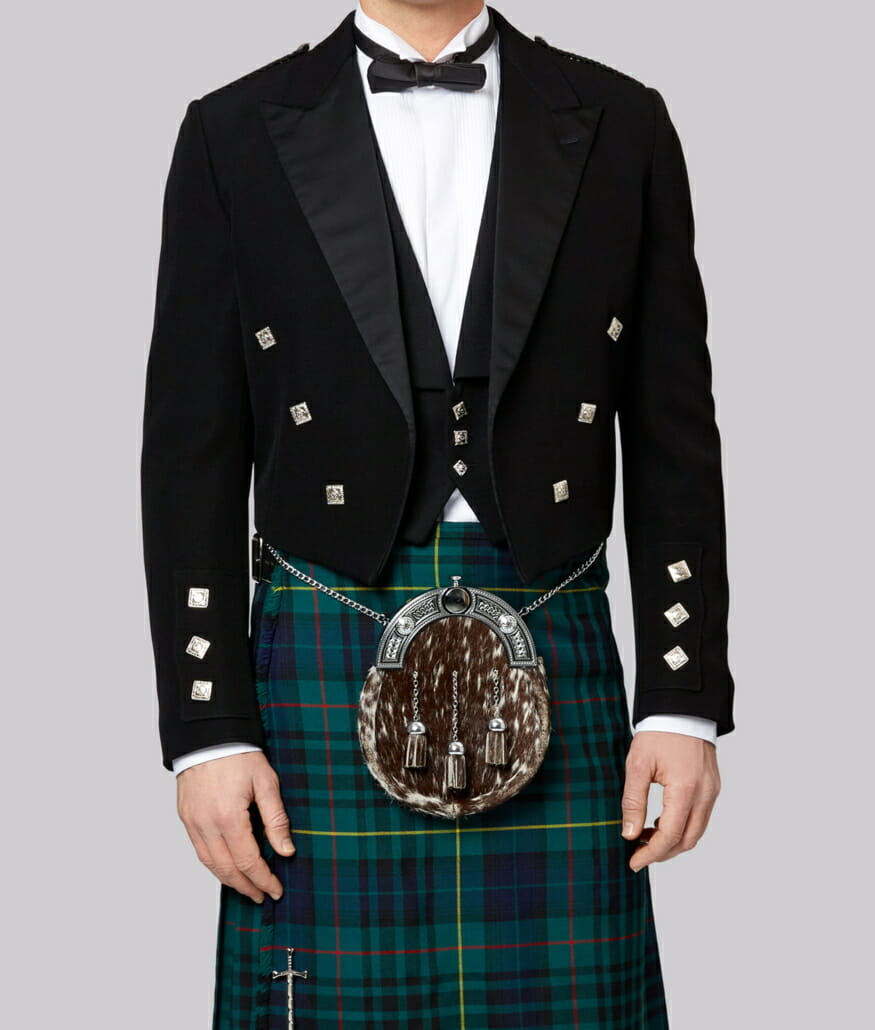
See Scottish Formal Attire for a description the Prince Charlie jacket and other details of Highland Dress, as well as the Welsh and Irish equivalents.
(Not So) Well-Suited: Avoid Black-on-Black Shirt and Bow Tie Combinations
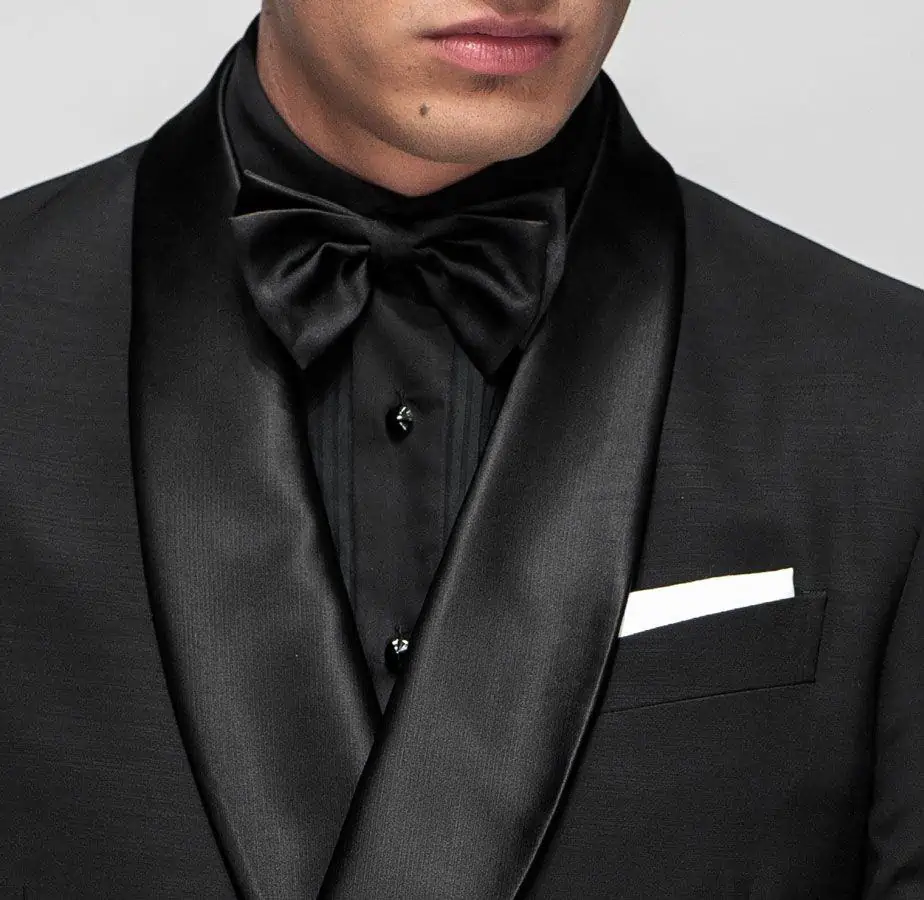
Despite the rising popularity of monochromatic ensembles, most style authorities cringe at the pairing of black shirts and black bow ties, dismissing the look as something between “goth or fascist fashion” and “funkily funereal.”
Well-Suited: Evening Eyewear
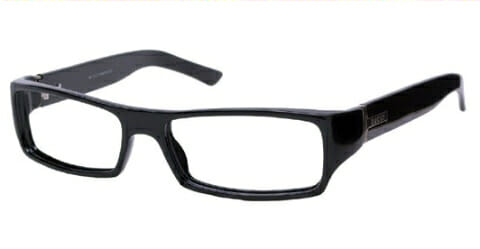
As noted in the book Men’s Wardrobe, formal evenings can be a good time to wear a different look in eyeglasses. Consider darker rims for a more dramatic effect.
Explore this chapter: 5 Contemporary Black Tie Tuxedo – Amending Perfection?
- 5.1 Style Over Fashion – Lessons From The Past
- 5.2 Contemporary Tuxedo
- 5.3 Black-Tie Waist: Contemporary Evening Vests
- 5.4 Contemporary Black-Tie Tuxedo Shirts
- 5.5 Contemporary Neckwear – The Black Necktie et al
- 5.6 Contemporary Tuxedo Shoes, Black Tie Accessories, and Outerwear
- 5.7 Contemporary Alternatives and Personalization
